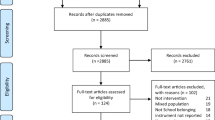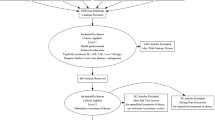Abstract
This paper reports on the findings of a yearlong qualitative research project into school change and inclusion. The whole school framework known as the Index for Inclusion was utilised in an Aotearoa New Zealand high school. Findings showed the Index to be a flexible tool and suitable for achieving sustainable whole school development and professional learning. Additionally, Inclusive change involves a renegotiation of meaning. This renegotiation takes time, perseverance, and at times involves pain. Inclusion is linked to culture; it is a reflection of time and place. Inclusion can be developed within a school culture through reflecting on core values and through aligning those values with practice and artefact. In a devolved education system such as in Aotearoa New Zealand individual expressions of school culture and school leadership become strong influencing factors in the development of inclusion.
Similar content being viewed by others
References
Allan, J. (2005). Inclusion as an ethical project. In S. Temain (Ed.), Foucault and the government of disability. Ann Arbor, MI: University of Michigan Press.
Armstrong, A.C., Armstrong, D., & Spandagou, I. (2010). Inclusive education: International policy and practice. London: Sage Publications.
Baltzer, K., & Tetler, S. (2006). Developing inclusive school cultures in Denmark. The Danish University of Education. Retrieved from www.uppr.skoleintra.dk/Infoweb/indhod/Projekter/Inklusion/Susan%20Tetler%20og%20.
Belich, J. (1996). Making peoples: A history of the New Zelanders, from Polynesian settlement to the end of the nineteenth century. Auckland: Allen Lane.
Booth, T., & Ainscow, M. (2011). Index for inclusion: Developing learning and participation in schools. Bristol: Centre for Studies on Inclusive Education.
Bourke, R., Holden, B., & Dharan, V. M. (2007). “You think you’re doing it, but now I question myself”: Using a self-review process in New Zealand for learning and change. The International Journal of Diversity in Organisations, Communities and Nations, 7(2), 57–66.
Carrington, S. (1999). Inclusion needs a different school culture. International Journal of Inclusive Education, 3(3), 257–268. doi:10.1080/136031199285039.
Carrington, S., Bourke, R., & Dharan, V. (2012). Using the index for inclusion to develop inclusive school communities. In S. Carrington & J. Macarthur (Eds.), Teaching in inclusive school communities (pp. 341–366). Milton: Wiley.
Carrington, S., & Robinson, R. (2004). A case study of inclusive school development: A journey of learning. International Journal of Inclusive Education, 8(2), 141–153. doi:10.1080/1360311032000158024.
Connor, D. J., Gabel, S. L., Gallagher, D. J., & Morton, M. (2008). Disability studies and inclusive education–implications for theory, research, and practice. International Journal of Inclusive Education, 12(5–6), 441–457.
Denzin, N. K. (2003). Performance ethnography: Critical pedagogy and the politics of culture. Thousand Oaks, CA: Sage Publications.
Dharan, V. (2006). Enhancing effective practice in special education (EEPiSE): In it together. Kairaranga, 7((Special Edition)), 3–7.
Education Review Office. (2010). Including students with high needs. Wellington: Education Review Office.
Freire, P. (1996). Pedagogy of the oppressed. London: Penguin.
Giroux, H. (2007). Educated hope in dark times: Critical pedagogy for social justice. Our Schools, Our Selves, 17(1), 195–202.
Giroux, H. (2010). Lessons from Paulo Freire. The Chronicle of Higher Education, 57(9), 15–16.
Gramsci, A. (1971). Selections from the notebooks of Antonio Gramsci. New York, NY: International Publishers.
Jordan, S., & Yeomans, D. (1995). Critical ethnography: Problems in contemporary theory and practice. British Journal of Sociology of Education, 16(3), 389–408. doi:10.1080/0142569950160307.
Joseph, K. A. (2007). Implementing the social model of disability: Theory and research. International Sociology Review of Books, 22(2), 247–250.
Madison, D. S. (2005). Critical ethnography: Method, ethics, and performance. Thousand Oaks, CA: Sage Publications.
McMaster, C. (2012). Ingredients for inclusion: Lessons from the literature. Kairaranga, 13(2), 11–22.
McMaster, C. (2013a). Building inclusion from the ground up: A review of whole school re-culturing programmes for sustaining inclusive change. International Journal of Whole Schooling, 9(2), 1–24.
McMaster, C. (2013b). The inclusive practices tools: Trying to take a short cut to inclusion? New Zealand Journal of Teacher’s Work, 10(2), 220–230.
McMaster, C. (2014a). Elements of inclusion: Findings from the field. Kairaranga, 15(1), 40–47.
McMaster, C. (2014b). An island outside the mainstream? The special needs unit during a period of inclusive change in an Aotearoa/New Zealand high school. Journal of the International Association of Special Education, 15(2), 100.
McMaster, C. (2014c). Limiting the definition and the discourse: ERO limiting inclusion. In R. Wills, M. McLean, M. Stephenson, M. Morton, & R. Slee (Eds.), Tales from school: Learning disabilities and state education after administrative reform (pp. 109–118). Sydney: Sense.
McMaster, C. (2015a). Finding a ‘shady place’: A critical ethnography of developing inclusive culture in an Aotearoa New Zealand school. (PhD), University of Canterbury, Christchurch, New Zealand.
McMaster, C. (2015b). “Where is _____?”: Culture and the process of change in the development of inclusive schools. International Journal of Whole Schooling, 11(1), 16–34.
McMaster, C. (est. 2015). Educating all: Developing inclusive school cultures from within. New York, NY: Peter Lang Publishing.
McMaster, C., & Elliot, W. (2014). Leading inclusive change with the Index for Inclusion: Using a framework to manage sustainable professional development. Jounal of Educational Leadership, Policy and Practice, 29(1), 82–93.
Ministry of Education. (1996). Special Education 2000. Wellington: Ministry of Education.
Ministry of Education (2012). Success for all: Every school, every child www.minedu.govt.nz/NZEducation/EducationPolicies/SpecialEducation/OurWorkProgramme/SuccessForAll.aspx.
Ministry of Education (2014). Decile ratings. http://www.minedu.govt.nz/NZEducation/EducationPolicies/Schools/SchoolOperations/Resourcing/ResourcingHandbook/Chapter1/DecileRatings.aspx.
Mitchell, D. (2010). Education that fits: Review of international trends in the education of students with special educational needs, final report. Christchurch: Univeristy of Canterbury.
Neilson, W. (2005). Disability: Attitudes, history and discourses. In D. Fraser, R. Moltzen, & K. Ryba (Eds.), Learners with special needs in Aotearoa New Zealand (3rd ed., pp. 9–21). Melbourne: Cengage Learning.
Oliver, M. (1990). The politics of disablement. London: Macmillan.
Oliver, M., & Barnes, C. (2012). The new politics of disablement. New York, NY: Palgrave Macmillan.
O’Reilly, K. (2008). Key concepts in ethnography. London: Sage.
Prosser, J. (1999). School culture. London: Paul Chapman Publishing.
Royal, C. (2012). Towards a manifesto for indigenous development. Paper presented at the 5th Biennial International Indigenous Development Conference, University of Auckland, Auckland.
Save the Children. (2008). Making schools inclusive: How change happens, save the children’s experience. London: Save the Children.
Smith, A. (2005). Index for inclusion. Kairaranga, 6(2), 23–24.
Thomas, J. (1993). Doing critical ethnography: Qualitative research methods series #26. Newbury Park, IL: Sage Publishing.
Thomas, G., & Loxley, A. (2007). Deconstructing special education and constructing inclusion. Maidenhead: Open University Press.
Timperley, H., Wilson, A., Barrar, H., & Fung, I. (2007). Teacher professional learning and development: Best evidence synthesis iteration (BES). Wellington: Ministry of Education.
Williams, J. R. A. (2009). Experience of inclusive education in European countries: Keynote presentation. Paper presented at the International Conference on Pre-University Education, Pristina, Kosovo.
Wylie, C. (2012). Vital connections: Why we need more than self-managing schools. Wellington: NZCER Press.
Author information
Authors and Affiliations
Corresponding author
Rights and permissions
About this article
Cite this article
McMaster, C. Inclusion in New Zealand: The Potential and Possibilities of Sustainable Inclusive Change Through Utilising a Framework for Whole School Development. NZ J Educ Stud 50, 239–253 (2015). https://doi.org/10.1007/s40841-015-0010-3
Received:
Accepted:
Published:
Issue Date:
DOI: https://doi.org/10.1007/s40841-015-0010-3




